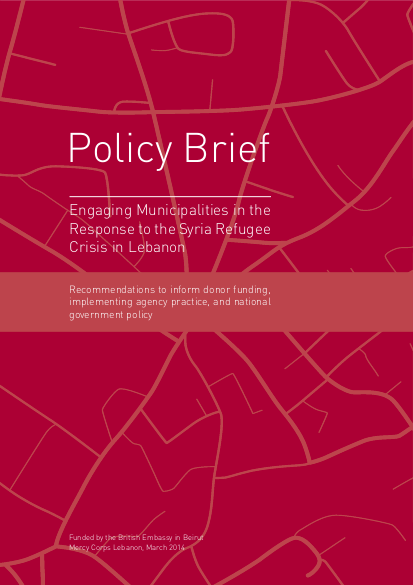
Lebanon’s political, economic, and social challenges preceded the Syria refugee
crisis. However, the population shift from Syria is causing enormous pressure on host communities and exacerbating instability triggers. With funding from the British Embassy in Beirut, Mercy Corps conducted in-depth assessments in 12 vulnerable municipalities in Lebanon and found that 71% of the surveyed host community indicated that conditions have worsened in their municipalities. For instance, 79% of municipalities identified service delivery (i.e. water, electricity, education) as their greatest challenge, which has a direct impact on the local populations’ ability to fulfil their basic needs. Also, 50% of the host community and 47% of the refugee population indicated that unemployment is their primary concern. As socio-economic conditions in the country continue to decline and political instability rises, it is projected that there will be an increased risk of intolerance and withdrawal of host community assistance to refugees.1 To strengthen social cohesion and prevent further political instability, humanitarian organisations, donor agencies and the central government must immediately focus on remedying the socio-economic impediments and wider systematic needs exacerbated by the Syria refugee crisis with conflict sensitive approaches.
However, while these challenges exist, there are bright spots as well as successful responses that municipalities across Lebanon have developed to manage the Syria refugee crisis. Despite this conventional wisdom about community-level tensions, Mercy Corps found that over 65% of Syrians felt welcomed by the host community, and only 23% of refugees currently feel that the Lebanese do not welcome them any longer. At the same time, 85% of Lebanese indicated that they felt a moral obligation to host Syrian refugees. Moreover, while municipalities lack key resources, they are proactive and working to address community-level needs. Out of the 12 surveyed municipalities, 100% are registering refugees and providing housing assistance, while 89% are facilitating assistance provision, 78% have increased their security presence with more staff in their communities, and 78% are providing dispute resolution facilities between refugee and host communities. Since municipalities are on the frontline of the crisis, they are aware of community needs, as well as how to best manoeuvre project implementation in such a delicate environment.
Mercy Corps sees enormous potential to address these pressing social-economic needs in collaboration with municipal actors because they understand and prioritise community needs, as well as know how to best operate project implementation within sensitive political, social, and economic dynamics. At the same time, Mercy Corps aims to initiate and advance discussions about modalities to create humanitarian and development hybrid approaches to increase the effectiveness of assistance at this critical juncture in Lebanon. Thus, it is essential that NGOs, donor agencies and the Government of Lebanon work to empower and support municipalities to strengthen their capacity to reconcile local-level challenges.
Resource collections
- UN Habitat - Urban Response Collection
- Urban Response - Urban Crisis Preparedness and Risk Reduction
- Urban Response Collection - Community Engagement and Social Cohesion
- Urban Response Collection - Economic Recovery
- Urban Response Collection - Environment and Climate Change
- Urban Response Collection - Housing, Land and Property
- Urban Response Collection - Urban Crisis Response, Recovery and Reconstruction
- Urban Response Collection - Urban Resilience